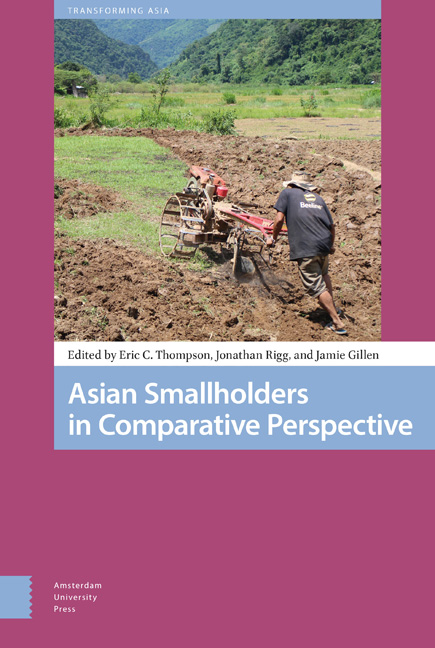Book contents
- Frontmatter
- Contents
- List of Maps, Figures and Tables
- Preface
- Introduction: Asian Smallholders in Comparative Perspective
- 1 Cambodia: Political Strife and Problematic Land Tenure
- 2 Indonesia: Whither Involution, Demographics, and Development?
- 3 Japan: Government Interventions and Part-time Family Farming
- 4 Laos: Responding to Pressures and Opportunities
- 5 Malaysia: The State of/in Village Agriculture
- 6 The Philippines: Fragmented Agriculture , Aquaculture, and Vulnerable Livelihoods
- 7 Singapore: Making Space for Farming
- 8 Taiwan: Toward the Revitalization of Smallholder Agriculture
- 9 Thailand: The Political Economy of Post-Peasant Agriculture
- 10 Vietnam: From Socialist Transformation to Reform
- Index
Preface
Published online by Cambridge University Press: 21 November 2020
- Frontmatter
- Contents
- List of Maps, Figures and Tables
- Preface
- Introduction: Asian Smallholders in Comparative Perspective
- 1 Cambodia: Political Strife and Problematic Land Tenure
- 2 Indonesia: Whither Involution, Demographics, and Development?
- 3 Japan: Government Interventions and Part-time Family Farming
- 4 Laos: Responding to Pressures and Opportunities
- 5 Malaysia: The State of/in Village Agriculture
- 6 The Philippines: Fragmented Agriculture , Aquaculture, and Vulnerable Livelihoods
- 7 Singapore: Making Space for Farming
- 8 Taiwan: Toward the Revitalization of Smallholder Agriculture
- 9 Thailand: The Political Economy of Post-Peasant Agriculture
- 10 Vietnam: From Socialist Transformation to Reform
- Index
Summary
This book owes its origins to conversations at a small roti prata-cum-coffee shop in Singapore, where two of the editors (Rigg and Thompson) discussed ways in which we could extend our prior research endeavours in rural Southeast Asia. There we conceived a project in which we would leverage the resources afforded us by the National University of Singapore and Singapore’s Ministry of Education to draw on the expertise of colleagues across East and Southeast Asia. We were fortunate to have Jamie Gillen join early in the conceptualization period of the project as well.
Our goal has been to inspire comparative analysis of the conditions that have led smallholder agriculture to change and transform, but also to persist, over the past century. This has been an era in which Asian societies have shifted from overwhelmingly rural and agrarian to urban and industrial. A key question for us has been: why is it that small-scale or smallholder agriculture appears to have persisted in Asia to a greater degree than is apparent in places such as the Americas or Europe, even while much of Asia has become as affluent and urbanized as those other regions of the world?
All three of us are grounded in traditions of primarily qualitative, ethnographic research in anthropology and human geography. Such research allows, at its best, for nuanced insights into the lives and experience of peoples and places. But it is also constrained in its comparative capacity, particularly when carried out by single researchers or small teams examining singular sites. In this project, we have sought to draw on a larger team of experienced researchers, whose expertise crosses ten countries in Southeast and East Asia. Indeed, we feel this is a particularly novel component of the project: our collaborations involve academics and researchers from across the countries in our study. The current volume is the first, comparative product of this project.
Smallholders in Asia examines the national-level histories and policies that have shaped the fate of small-scale agriculturalists. The contributors to this book, along with a large team of research assistants, provide here a broad-brush background, explaining the situation of small-scale agriculturalists in each of the ten countries covered in these pages. Our findings have been developed over a number of workshops held in Singapore.
- Type
- Chapter
- Information
- Asian Smallholders in Comparative Perspective , pp. 9 - 12Publisher: Amsterdam University PressPrint publication year: 2019

